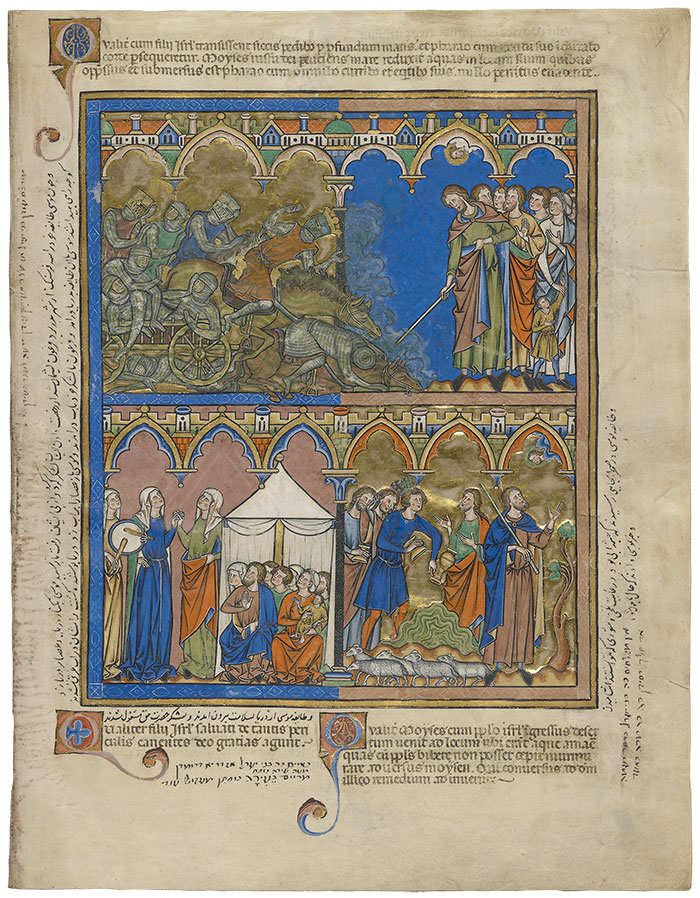
Divine Vengeance, A Joyful Celebration, Bitter Waters
Old Testament Miniatures with Latin, Persian, and Judeo-Persian inscriptions
Purchased by J.P. Morgan (1867–1943) in 1916
Divine Vengeance
Pharaoh learns that the Israelites are lost in the wilderness and vows vengeance upon them. Egyptian war chariots corner the Israelites at the Red Sea, and the people are certain of their doom. But Moses, at the Lord's command, raises his hand above the waters and miraculously parts the sea. The Israelites flee over dry land to the opposite shore, the Egyptians in bold pursuit. Now Pharaoh and his army pay the ultimate price for this conceit: with all of the Israelites safely ashore, Moses strikes the sea a final time, and the waters envelop the enemy. (Exodus 14:21–30)
A Joyful Celebration
Miriam, prophetess and sister of Aaron and Moses, plays a timbrel as other women dance and rejoice. Seated before a tent, Moses and the Israelites look on and give thanks to the Lord. Notice how Miriam's gaze is directed toward the drowning horse and rider above, perhaps a literal reference to her words of praise: "Sing to the Lord, for He has triumphed gloriously! The horse and his rider He has thrown into the sea!" (Exodus 15:1–21)
Bitter Waters
In the wilderness, the bitter waters of Marah dismay the people, and the flocks thirst, but the Lord hears Moses' plea and reveals to him a tree that will sweeten the waters. (Exodus 15:22–24)
Folio 9r (Latin)
Upper half: How, when the children of Israel crossed the depths of the sea with dry feet, and Pharaoh, his heart hardened, was pursuing them with his host, Moses, striking the sea as God had ordered, reduced into one place the sea water in which Pharaoh was overwhelmed and submerged with all his chariots and horses, absolutely none escaping. (Exodus 14)
Lower left: How the children of Israel, saved from such dangers, give thanks to God. (Exodus 15: 1–21)
Lower right: How Moses and the people of Israel, having entered the desert, came to a place where the water was bitter and, as the people could not drink it, they began murmuring against Moses. He, turning to God, devised a remedy on the spot. (Exodus 15: 23–26)
Folio 9r (Persian)
*Left margin: And when Moses had led his tribe three leagues out of the city, Pharaoh regretted having released them. He gathered the army and pursued them. When Moses reached the seashore and struck the sea with his staff, a path appeared. Moses with his people stepped into the sea and Pharaoh and his army [also] entered the water. And Moses struck the water again and the sea closed in and they [the Egyptians] drowned.
Lower left: The tribe of Moses emerged from the sea unscathed and embarked on praising his Excellence the God.
*The inscription begins in the Left Margin and continues beneath the Lower Left quadrant.
Lower right margin: The tribe of Moses reached a place in the desert where there was a well of water [so] exceedingly bitter and salty that they could not drink and they informed Moses wondering what shall happen to them.
Folio 9r (Judeo-Persian)
Left margin, furthest left: Having been authorized, the Children of Israel [exit] from Egypt. Pharaoh, repenting [of having granted permission], sends the army after them.
Lower left, beneath Latin: Here it is that the Children of Israel, having come out of the sea, Moses [and] Miriam busied themselves with singing.
Lower right margin, bottom corner: This is the scene when the Children of Israel arrived at the spring of bitter water, which was Marah.
Italicized words are in Hebrew.
Content consultant: Richard Leson
Persian translated by Sussan Babaie
Judeo-Persian translated by Vera Basch Moreen
Latin translation by Eran Lupu
After the commentary volume accompanying the Fine Art Facsimile edition by Faksimile Verlag Luzern
